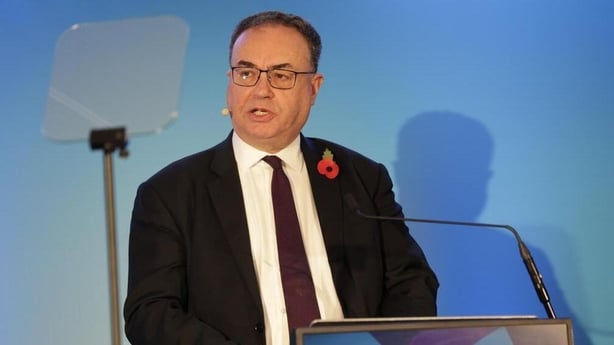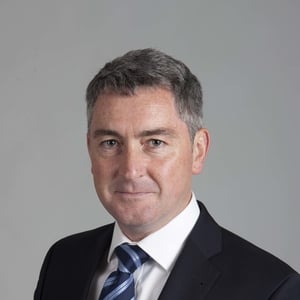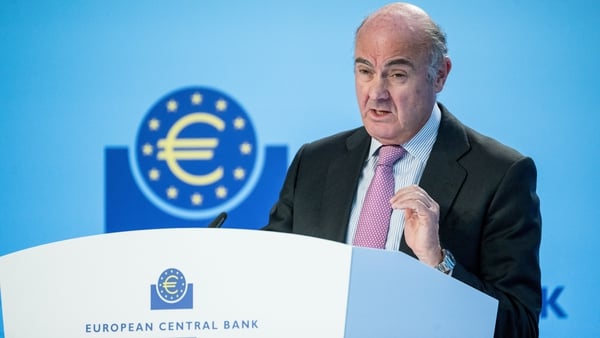The Governor of the Central Bank Gabriel Makhlouf has said the economy and financial system "is still adjusting to the change in interest rates by central banks."
Gabriel Makhlouf told a conference at the Aviva Stadium, hosted by the Central Bank, that the domestic economy is still growing "albeit at a slower pace".
Mr Makhlouf said monetary policy is taking hold "both domestically and globally".
He said "early signals" on the impact of inflation and higher interest rates on borrowers' ability to cope "are becoming visible" among tracker mortgages, personal loans and some commercial lending.
The Central Bank is seeing "vulnerabilities" in commercial real estate, but he said the "broad macro picture" shows resilience in the economy and financial system.
The Governor also announced that the Central Bank has decided to defer the application of the Individual Accountability Framework (IAF), which is a new code of conduct for senior executives in financial firms to Independent Non-Executive Directors.
The reason for this is to "learn from the introduction of the new framework to executives in the first instance as well as how we will use the framework to inform our supervision".
The keynote address at the conference today was delivered by the Governor of the Bank of England Andrew Bailey.
In a discussion, Andrew Bailey said he believed it was too early to be talking about cutting rates in the UK and that monetary policy is going to have to be restrictive for an extended period.

He said the Bank of England is still looking at a two year horizon to get inflation back to its target rate of 2%.
His comments were echoed by Gabriel Makhlouf in reference to the euro area economy.
Governor Makhlouf said it is "far, far too early to start talking about when we're going to start cutting rates".
He said it is too early to declare "we’ve reached the top of the ladder" when it comes to inflation.
He said the ECB will look carefully at the data before its next meeting in December. He said the ECB will get inflation down to 2% but "the important thing is to get there".
Bank of England Governor Andrew Bailey said said today that he hoped to see further close regulatory cooperation on investment funds with his Irish counterparts to minimise fragmentation of financial markets following Brexit.
"We agree on, and both emphasise, the pressing need for action to implement the Financial Stability Board's recommendations for enhancing the resilience of money market funds," Mr Bailey said.
"And we are both committed to the review and, I believe, upgrade of the standards for managing risks in open-ended funds," he added.
Today's conference brings together diverse perspectives on issues such as uncertainty in the geo-economic environment, how secure customers' interests are secured, individual accountability and EU financial regulation.
Meanwhile, a rise in geopolitical tensions across the world could aggravate already subdued growth in Europe and China and the spillover may alter the path of the US economy, Federal Reserve Governor Lisa Cook said at the Central Bank's Dublin conference today.
"Clearly what happens to the rest of the world affects the US and right now economic growth is pretty subdued among our major trading partners," Cook said during a panel discussion at the Aviva Stadium.
"We are not only watching subdued growth, we're watching the geopolitical tensions that we're all talking about, and that could change the outlook both in the US and the global economy," she added.
Cook added that geopolitical tensions may in particular destabilise commodity markets and access to credit in the current higher interest rate environment.
Next up @drlisadcook, from @federalreserve takes to the podium to introduce our first panel discussion on the changing macro-economic context. #FSC2023 pic.twitter.com/li90pEqebn
— Central Bank of Ireland (@centralbank_ie) November 8, 2023
"Any shock could make the situation worse that we're already in and could be destabilising to commodity markets, could be destabilising to the system of credit," Cook said. "We are watching and waiting. We're being vigilant."
Cook's comments followed a speech in which she outlined in more detail a number of international risks, including conflict in Ukraine and the Middle East, as well as persistent inflationary pressures abroad and a further economic slowdown in China, that she said could threaten global financial stability.
She did not detail her view of the US economic outlook or comment on the Fed's policy interest rate, nor did she give a sense of how likely she felt any of those potential risks were to becoming reality.
Additional reporting by Reuters






